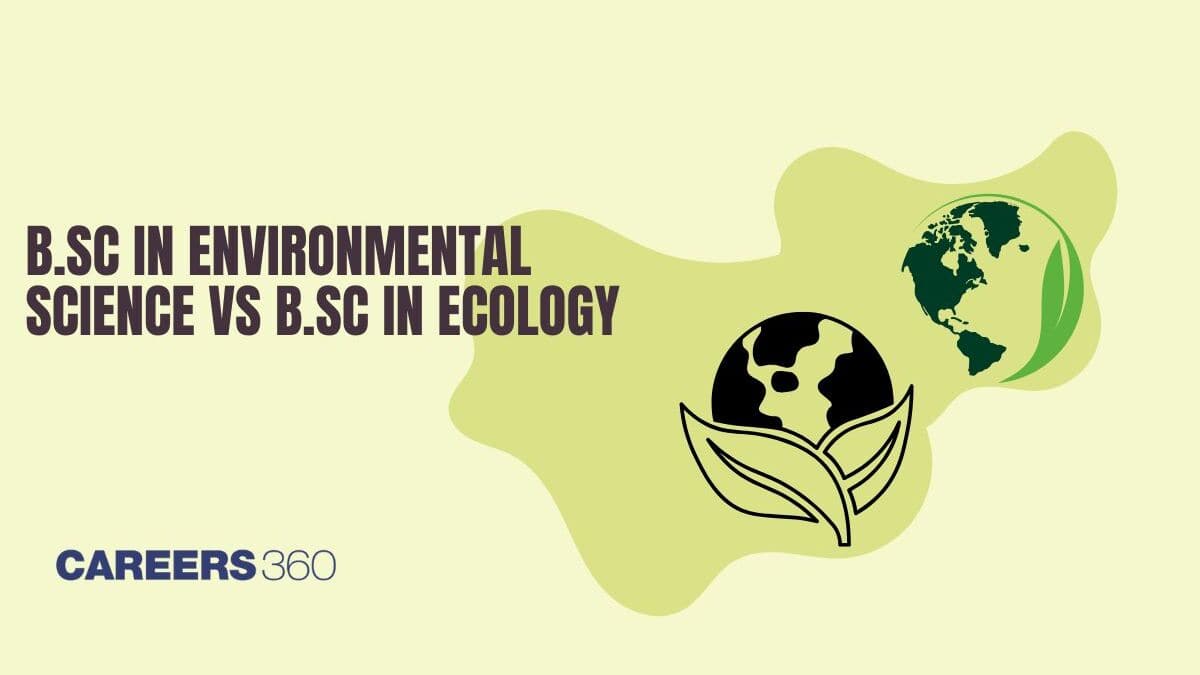GNIOT Greater Noida B.Sc Admissions 2026
NAAC A+ Accredited | Industry vetted curriculum | Scholarships to Meritorious Students
Choosing between the BSc Ecology and BSc Environmental Science can be overwhelming for students. Both of these courses offer promising careers for those interested in environmental studies. Although BSc Ecology and BSc Environmental Science both focus on the environment, they differ in their approach, scope and objectives.

In the table mentioned below, we have discussed some important highlights of BSc Environmental Science and BSc Ecology. However, students are advised to check the official website or the programme brochure released by the provider for further information.
| Particulars | BSc Environmental Science | BSc Ecology |
|---|---|---|
Course Level | Undergraduate | Undergraduate |
Eligibility Criteria | 10+2 in the science stream | 10+2 in the science stream |
Course Curriculum | Climate Science, Environmental Chemistry, Waste Management, Cell Biology, Water and Water Resources | Biodiversity, Conservation Biology, Population Ecology, and Ecological Modelling |
Job Roles | Environmental Consultant Conversation Scientist Environmental Policy Analyst Environmental Scientist | Conservationist Ecologist Wildlife Biologist Naturalist |
BSc Environmental Science is a three-year undergraduate degree programme, spread across six semesters. It provides a broader understanding of environmental issues and studies the interaction between humans with the environment. Studying BSc Environmental Science is ideal for addressing challenges such as pollution, climate change, and resource management.
BSc Environmental Science Eligibility Criteria- Students who have completed their 10+2 in the Science stream with Physics, Chemistry, and Biology as compulsory subjects can apply for this course.
BSc Environmental Science Course Curriculum- Climate Science, Environmental Chemistry, Waste Management, Cell Biology, Water and Water Resources, and Ecology and Ecosystems. The curriculum also includes fieldwork, laboratory experiments, and internships in environmental organisations.
Bachelor of Science in Ecology or BSc Ecology is an undergraduate degree programme of three years duration. It is the study of ecosystems and the relationship and interaction between the living organisms and their environment. Students learn how ecosystems work and the factors that influence biodiversity.
BSc Ecology Eligibility Criteria - 10+2 in science stream from a recognised university in India.
BSc Ecology Course Curriculum - The course curriculum of BSc Ecology includes courses such as Ecosystem dynamics, biodiversity, conservation biology, population ecology, and ecological modelling. It also includes extensive field studies, habitat assessments, and wildlife research projects.
While both the courses offer good career options, if you are interested in tackling global environmental issues such as climate change and resource management, BSc Ecology is an ideal course. However, if you want to specialise in species conversation, ecosystem studies, and biodiversity research, BSc Environmental Science is a perfect course.
Both environmental science and ecology are important for the protection of our planet. Environmental Science will be an ideal course if someone is interested in gaining multidisciplinary knowledge of environmental problems. However, if you are interested in understanding and conserving ecosystems, Ecology is the way to go.
On Question asked by student community
Since you are a candidate in the first year of a BSc course, your qualification code in NEET UG is 02. You can check the NEET UG qualification codes before starting the registration process.
Hi
Students who require BSc Radiology admission in Delhi must pass 10+2 with Physics, Chemistry, and Biology with 50% aggregate marks. Click on the link below to learn more about the top colleges.
Mentioned below are some of the courses that have high scope in BSc .
In Chandigarh, PGIMER is known as one of the best medical colleges. For paramedical courses, the university will resume registrations in June 2026.
The SSUHS BSc Nursing Entrance Exam 2026 is conducted by the Srimanta Shankardeva University of Health Sciences for admission to B.Sc. Nursing courses in Assam. The exam is held once a year in offline mode, is 2 hours long, and carries 100 marks. For each correct answer, +1 mark will
Among top 100 Universities Globally in the Times Higher Education (THE) Interdisciplinary Science Rankings 2026
Among top 100 Universities Globally in the Times Higher Education (THE) Interdisciplinary Science Rankings 2026
Master's programs in Sustainability Science and Practice; Climate Change Science and Practice; Urban Economic and Infrastructure Development; Human Development Policy and Practice
Apply for UG & PG programs from Victoria University, Delhi NCR Campus
Ranked #18 by NIRF, NAAC A++ Accredited | Unmatched clinical exposure with over 7 lakh patients yearly
NAAC A+ Accredited | Among top 2% Universities Globally (QS World University Rankings 2026)